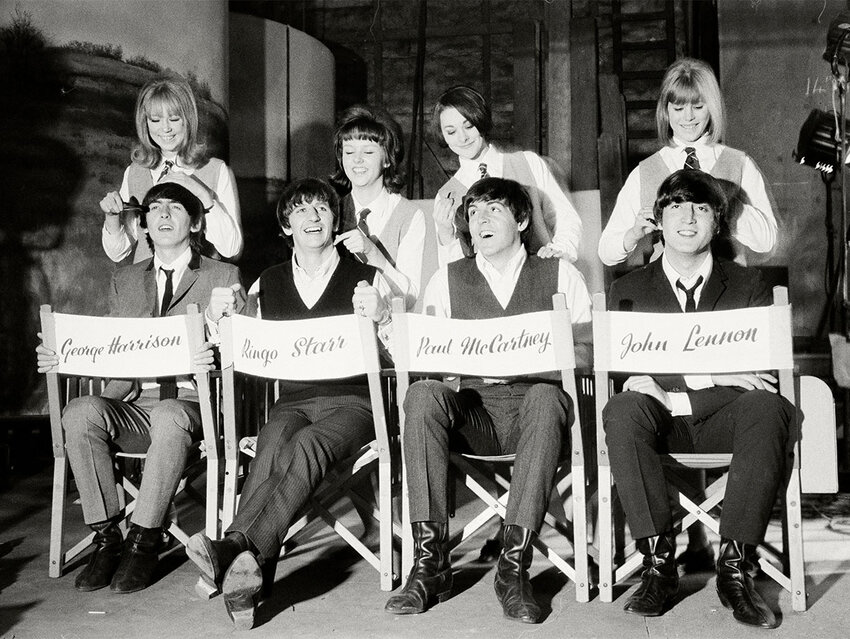The decade of the 1960s is remembered for its iconic trends (Motown, Beatlemania, and hippies, to name a few) and significant cultural moments (Woodstock, March on Washington, and landing on the moon, among others). With so many changes in fashion, art, and politics, these years gave us many well-known words and sayings still in use today.
Fashion
Miniskirt: Hemlines had been rising for a few decades, but skirts were first called “miniskirts” in the 1960s. These above-the-knee hemlines symbolized the spirit of liberation and self-expression in this era.
Chelsea boots: These ankle-high boots have been around since the Victorian era; however, they became ultra-fashionable in the 1960s, when members of British rock bands such as the Rolling Stones and the Beatles started sporting them. The name comes from Chelsea, an area of West London where many of the fashionable folks of the ’60s spent their time.
Bell-bottoms: Also known today as “flares,” these pants feature a bell-like shape at the bottom of the leg. Though this trousers style was worn by sailors as far back as the early 1800s, bell-bottoms became popular in the mainstream, along with miniskirts and Chelsea boots, thanks to the “Swinging London” fashion scene.
Music
Twist: In 1960, Chubby Checker released his version of “The Twist,” which created a craze that swept across dance floors all over the world. The name comes from the dance movement, which involves twisting your hips from side to side. Over the next few years, various artists released more Twist-inspired songs, including “Let’s Twist Again” (Chubby Checker), “Peppermint Twist” (Joey Dee), “Twistin’ the Night Away” (Sam Cooke), and “Twist and Shout” (The Beatles).
Acid rock: Also known as “psychedelic rock,” this subgenre of rock ’n’ roll music was named for the hallucinogenic drugs popular in the 1960s. Genre-establishing artists include the Doors, the Jimi Hendrix Experience, and the Grateful Dead.
Beatlemania: The Beatles were the biggest musical act of the 1960s, so the fanaticism surrounding the band was dubbed “Beatlemania” by the press. Today, we have Swifties, but the Beatles were one of the first musical acts to redefine the concept of celebrity.
Technology
Launch window: The first human entered space in 1961, and space exploration immediately captured the world’s imagination. In the following decade, space-related terms became part of the everyday lexicon. The “launch window” is a calculated period when a rocket must be launched to reach its target.
Shuttle: The word “shuttle” initially referred to weaving supplies or gaming darts, until it became associated with air travel. Then, in the 1960s, folks regularly discussed space shuttles shooting into the sky.
Byte: The term “byte” was coined by scientists in the late 1950s as digital data became more critical, laying the groundwork for the computer-centric future.
Database: The '60s saw the early stages of database development. Charles Bachman designed the first integrated database system in 1960, with many others following throughout the decade.
Software: The programs and applications that tell a computer what to do are called software (as opposed to the physical components called “hardware”). John Wilder Tukey coined this term in the late 1950s, and it was used more widely throughout the 1960s.
Protest
Doves: As the Vietnam War continued throughout the 1960s, public interest and involvement in the conflict grew. Symbolizing peace advocates, doves were associated with the anti-war movement that gained momentum during this decade.
Hawks: Hawks represented those advocating a more aggressive approach to the Vietnam War. While the monikers were used quite widely in the 1960s, the terms “doves” and “hawks” had been used as far back as the War of 1812.
Nonproliferation: During this decade, the call for nuclear nonproliferation gained traction, reflecting efforts to slow the spread of nuclear weapons. In 1968, the Treaty on the Non-Proliferation of Nuclear Weapons was signed by many nations worldwide. It ultimately did not stop the spread of these weapons, but it was seen as setting a major precedent.
Slang
Wigged-out: If you’re upset or annoyed, you might be “wigged-out.” This slang comes from the 17th-century trend of men wearing a periwig to cover the top of their head. In a state of distress, they might “flip their wig.” The earliest reference for “wigged-out” is in 1960.
Baby boomers: “Boomer” is still widely used today, but the term “baby boomer” started to be tossed around while they were still being born. This post-World War II group came about from the mid-1940s to the mid-1960s. News references from the early 1960s discussed changes the world might see as a result of the baby boomers becoming adults, such as a spike in college enrollment.
Vibes: After the Beach Boys released the song “Good Vibrations” in 1967, “vibes” became, well, a whole vibe. This abbreviated term captures the energy of a particular situation and is still used today to describe that distinct emotion.
Fab: Short for “fabulous,” this term became integral to the ’60s slang lexicon, expressing enthusiasm or approval.
Knockout: Once a boxing term, this word came to describe a strikingly attractive person in the 1960s. In a sense, you’re being knocked off your feet by the other person’s good looks.
Featured image credit: Sueddeutsche Zeitung Photo/ Alamy Stock Photo

